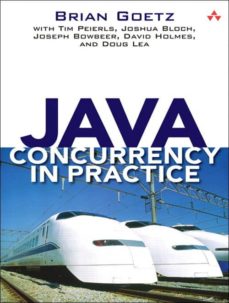JAVA CONCURRENCY IN PRACTICE ePub gratis
JAVA CONCURRENCY IN PRACTICE de
Ficha técnica
- JAVA CONCURRENCY IN PRACTICE
- Número de páginas: 384
- Idioma: INGLÉS
- Formatos: Pdf, ePub, MOBI, FB2
- ISBN: 9780321349606
- Editorial: ADDISON-WESLEY
- Año de edición: 2006
Descargar libros electrónicos gratis en ingles JAVA CONCURRENCY IN PRACTICE de 9780321349606 MOBI ePub PDB (Spanish Edition)
Overview
Threads are a fundamental part of the Java platform. As multicore processors become the norm, using concurrency effectively becomes essential for building high-performance applications. Java SE 5 and 6 are a huge step forward for the development of concurrent applications, with improvements to the Java Virtual Machine to support high-performance, highly scalable concurrent classes and a rich set of new concurrency building blocks. In Java Concurrency in Practice, the creators of these new facilities explain not only how they work and how to use them, but also the motivation and design patterns behind them.
However, developing, testing, and debugging multithreaded programs can still be very difficult; it is all too easy to create concurrent programs that appear to work, but fail when it matters most: in production, under heavy load. Java Concurrency in Practice arms readers with both the theoretical underpinnings and concrete techniques for building reliable, scalable, maintainable concurrent applications. Rather than simply offering an inventory of concurrency APIs and mechanisms, it provides design rules, patterns, and mental models that make it easier to build concurrent programs that are both correct and performant.
This book covers:
Basic concepts of concurrency and thread safety
Techniques for building and composing thread-safe classes
Using the concurrency building blocks in java.util.concurrent
Performance optimization dos and don'ts
Testing concurrent programs
Advanced topics such as atomic variables, nonblocking algorithms, and the Java Memory Model

